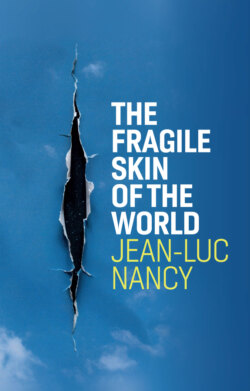Читать книгу The Fragile Skin of the World - Jean-Luc Nancy - Страница 11
4
ОглавлениеBecause Christianity, this shoot growing out of a Jewish base, came about, in essence, as an attempt to respond to the turmoil of Rome. I believe that a clear sign of this is given by the attitude of the emerging Judeo-Christianity to wealth. We know all about this, but we do not spend enough time asking what it means. The critique of wealth had been initiated by philosophy and by Judaism, which is significant. But what appeared with Rome, in what one might think of as a much more decisive manner, is the substitution of a wealth that I would name that of use for a wealth that I would call one of glory. By the former, I mean a wealth that is employed in relational transactions (commerce, construction, etc.); by the latter, a wealth accumulated for the glory of its bearer – for example, the gold and the adornments of a pharaoh, or the gold that covers the biblical ark. I use the word ‘glory’ in order to evoke that which this notion retains of the sacred. I use the word ‘use’ to distance myself somewhat from a too simple opposition between use value and exchange value. What is important to grasp is this: Rome (in truth preceded by others such as Byblos, Tyre, Athens, Carthage, etc.) was the site of a mutation of technics, domination, and wealth – a mutation that determines the slow gestation of the West.
Christianity is at once the product, the symptom, and the intensification of this mutation. It is the product because it merges within itself the great aspirations that had been at work for centuries in the disappearance of sacred worlds: the Greek autonomy of a logos, the Jewish alliance with a wholly other, the forces originating from the entire eastern Mediterranean, from Egypt, and from the Etruscans. What develops there is a powerful catalyst from which emerges a new culture of mastery and enterprise, project and emancipation. Christianity is a double symptom of this: on the one hand, it transfers power outside of the world, situating glory and accomplishment in another kingdom (thus effectively slitting the throat of the terrestrial kingdom), and on the other hand, by inviting man to renew himself, it opens him to a liberty that is no longer that of status, but activity: the new man is a task to undertake. In this sense, Christianity at once diverts and galvanizes the energetic, achievement-oriented drive that the Roman mutation bore.
This does not immediately produce all of its effects, which require detours as long as those that preceded the Roman Empire. But when the mutation that initiates modern Europe begins, we already find the threefold characteristic of technique, domination, and wealth that will henceforth be at the heart of a heightened complexity of Christianity, which has at once installed itself as terrestrial power and, by this very fact, finds that it is obligated to call itself into question and to displace itself (if not to deconstruct itself) – just as it is always in the process of doing.
I will return below to this complexity. For the moment, I will conclude with the birth of what, in six or seven centuries, has become the West. (I will bypass here the part played in this history by Islam, which was initially a notable participant in this enterprise, before turning away from it and towards another history.)
Towards the fourteenth century, the sequence that is proper to the Western enterprise gets fully underway: technics, domination, and wealth arise from a single principle, one based on setting in motion and expanding. What we call capitalism represents the systematic development of this principle, for which one might propose the name investment. To ‘invest’ is to surround, to envelop (to ‘vest’) a specific object in order to appropriate it. Technics invests a specific operation (that of transporting, piercing, etc.); domination invests the exercise of control (of people, goods, techniques); wealth – considered here as tending completely towards that of use – invests the growth of its own capacity to invest (thanks to and for the purpose of every kind of technics and domination).
Almost a century ago, during the Second World War, Valéry was able to write:
Europe is coming to the end of an incredible, brilliant, and deplorable career, bequeathing to the world [. . .] the dark present of positive Science and the sad example of a wealth that nowhere before has taken such complete precedence over customs, traditions, and every possible thing.3
By ‘positive science’, Valéry means, as he says elsewhere, science as ‘power – that is, formula or recipe for action’, in other words what has come to be known as ‘techno-science’, which it suffices to call ‘technics’. As for wealth, Valéry is neither a social Christian nor a communist, which makes his judgement all the more striking. All that remains is to note the convergence of science and wealth, which he does elsewhere: ‘The power of action has conquered the domain of knowledge [. . .] along with its practical equivalent of wealth, and all the unstable properties of the latter.’4
We can hardly do more than add the following, which was not yet clearly visible for Valéry. One of the unstable properties of wealth lies in the way it transforms: on the one hand, it transforms social relations, to the point of dragging the greatest number into misery, reserving for an ever smaller majority an ever more insolent and powerful opulence; on the other hand, it transforms the relations of subsistence between man and the rest of the world into a paralysis of such a nature that subsistence exhausts itself within it.
